- How Much Weight Can You Realistically Lose in 3 Months? - January 14, 2024
- How To Lose 1kg a Week (Guaranteed) - August 20, 2023
- How To Count Calories (or Estimate) and Stay on Track When Eating Out at Restaurants - July 25, 2023
WHAT IS BODY RECOMPOSITION?
Body Recomposition isn’t actually a scientifically accepted or ‘objective’ term but it is used among bodybuilding circles to describe the process of simultaneously losing fat and gaining muscle.
I’d argue however that the term should also be used for gaining muscle while maintaining body fat AND losing body fat while maintaining muscle.
Why?
Because in both of those examples (as with gaining muscle and losing body fat), You’d be improving your body composition (i.e. the ratio of muscle to fat).
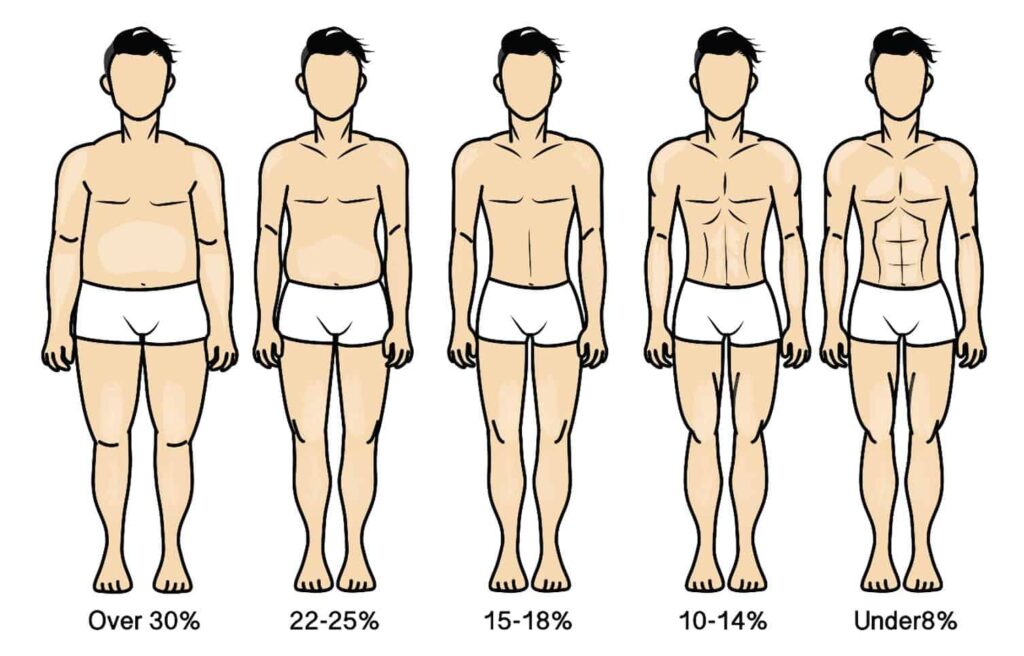
Therefore – aiming to either gaining muscle while maintaining body fat or losing body fat while maintaining muscle are both equally valid methods (and actually, much more achievable) as aiming to gain muscle and lose body fat.
IS BODY RECOMPOSITION TECHNICALLY POSSIBLE?
Yes.
There’s been much debate and controversy around this topic for years in bodybuilding circles mainly because of the entrenched belief that in order to lose body fat you need to eat in a calorie deficit (not necessarily true)* and to gain muscle you need to eat in a calorie surplus (also not necessarily true).
Think about it….
Lose Weight, Gain Muscle
You could be in a calorie deficit, lose fat, but gain muscle. Let’s say you lost 1kg (2.2lbs) of weight. You may have actually lost 1.5kg (3.3lbs) of fat, but gained 0.5kg (1.1lbs) of muscle. This puts you at a total loss of 1kg (2.2lbs) but you’ve improved your body composition, i.e. you’ll look a lot better because you’ve reduced your body fat levels and increased your muscle mass.
Gain Weight, Lose Fat
Similarly… You could be in a calorie surplus; gain muscle, and lose fat. In this example, you gain 1kg, of that 1.5kg (3.3lbs) is lost fat, and 0.5kg (1.1lbs) is gained muscle.
Maintain Weight, Lose Fat + Gain Muscle
You could keep your weight exactly the same, lose fat AND gain muscle. In this exa
mple, you might lose 0.5kg (1.1lbs) of fat, and gain 0.5kg (1.1lbs) of muscle – happy days!
It’s pretty easy to see how this is possible, but if you don’t believe me, here’s what the studies say…
This study from 2000 fed overweight police officers a hypocaloric, high protein diet over 12 weeks, resulting in positive changes inbody composition, i.e. more muscle and less fat.
This study, carried out on Gymnasts was designed to test the effects of Ketogenic diets on training performance, but also found that…
“athletes who unedrwent a VLCKD [Very Low Calorie Ketogenic Diet] with adequete protein intake lost weight and improved body composition without any negative changes in strength and power performancePaoli et al, 2012
Perhaps the strongest evidence that recomposition is possible came from this 2016 study that aimed to discover whether higher protein intakes were better at maintaining lean body mass (muscle) when dieting. This study found that…
“during a marked energy deficit, consumption of a diet containing 2.4 g protein · kg(-1) · d(-1) was more effective than consumption of a diet containing 1.2 g protein · kg(-1) · d(-1) in promoting increases in LBM and losses of fat mass when combined with a high volume of resistance and anaerobic exercise”
Longland et al, 2016
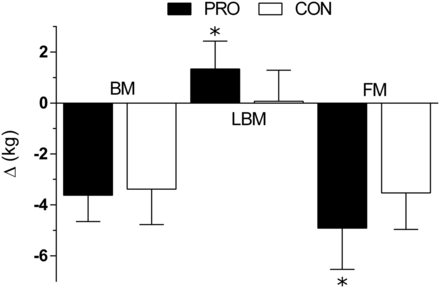
This graph essentially shows that the group eating 2.4g of protein per Kg of bodyweight lost weight overall, losing on average 4.5kg of Fat Mass, and gaining an average of 1.5kg of Muscle.
So, body recomposition IS possible, but should YOU do it?
IS BODY RECOMPOSITION OPTIMAL (FOR MOST PEOPLE)?
No.
Why? Because most people would be far better off picking a goal and throwing all their resources at it.
Recompositioning is like trying to learn the guitar while skiing backwards – it can technically be done, but you’d be much better off focusing on the guitar, or skiing and getting really good at one, rather than being very average at both.

Like Skiing and playing the Guitar, ganing Muscle and losing fat are difficult enough to do on their own, let alone at the same time.
Want to lose fat? Great. Train with progressive overload to keep the muscle you already have (you may even be lucky enough to build extra muscle – but don’t worry about that) and eat in a big enough calorie deficit so you lose all the weight you want to lose, within the time frame you want to lose it. Eat a minimum of 1.5g of protein per Kg of bodyweight.
Want to gain muscle? Also great – train with progressive overload and eat in a *slight* calorie surplus that will allow you to gain around 0.5kg per month. If you don’t care about gaining body fat, eat as many calories as you want. Eat a minimum of 1.5g of protein per Kg of bodyweight.
Both these approaches will be optimal for the stated goal – trying to do both at the same time will mean most people spinning their wheels and getting nowhere (or looking worse).
There may be some people that recompositioning IS a good idea for however.
*N.B. To lose WEIGHT you will need to eat in a healthy calorie deficit , but you can lose FAT in a calorie surplus
WHO CAN AND SHOULD RECOMPOSITION?
Although it is tough, recomposition can and should be used by specific people at specific times;
Experienced Lifters
People that have been lifting for a long time (10-15 years) likely know their body very well and what it responds to. An total beginner trying to recomposition makes no sense – they have no idea how much training volume and how many calories/protein they need to build muscle or lose fat – let alone trying to do it while maintaining their body weight.
‘Gaintainers’
If you’re happy with the level of body fat or muscle that you have, you can simply do what some have termed ‘gaintining’, i.e. maintaining the same weight but trying to build some muscle slowly. You don’t care how slow happens because you’re already broadly happy with what you have. This is a nice place to be.
People that are patient
This kind of applies to gaintainers – the less of a calorie surplus you’re in, the more slowly you’ll build muscle (this doesn’t mean that the more calories you eat, the quicker you’ll gain muscle – there’s a limit!). In order to lose or maintain body fat while simultaneously building muscle, your calorie surplus will need to be very small (or non-existent), so you’ll need patience
People that don’t want to gain ANY fat
Same as above – if you want to totally eliminate the chance of ANY fat gain, you’ll need to ensure that you’re eating at maintenance at the very most. As stated above, this means that building muscle will take a bit more time.
People just focusing on their health and fitness
If you’re perfectly happy at your current weight, and just want to work on optimising the nutrient density to achieve optimal health and fitness (whatever that means), then recomping is probably a great goal for you.
HOW TO RECOMPOSITION
So you’ve decided you want to attempt a ‘recomp’, how do you go about it?
Training
Training-wise, you’ll need to implement progressive overload (this should really be the case regardless of the situation). For more on progressive overload, click here
Calorie Intake
When it comes to calorie intake, I’d recommend eating at maintenance calories, this way you’ll maintain your current weight, but shift it in favour of muscle and away from fat, so you’ll end up looking a lot better.
If you want a guide on calculating your maintenance calories, click below and you’ll get a guide straight in your inbox.
IS THERE AN IDEAL RECOMPOSITION DIET?
Not really, no.
In order to achieve body recomposition, as stated above I’d probably aim to stick at maintenance calories. This should ensure you’re getting all the energy you need to train and build muscle, whilst reducing or least maintaining body fat. Your other option is to eat in a slight calorie deficit, although doing this will limit your ability to build maximal muscle.
Use this calculator to find your estimated maintenance calories. This will give you a good starting point, but you’ll actually need to weigh yourself everyday to ensure it is actually your maintenance – if your weight barely changes over say, a 2 week period, you can be pretty confident it’s your maintenance!
In terms of your recomposition macros – these shouldn’t be very different from your macros when aggressively cutting or during a conscious period of weight gain. Ensure you eat 1.5g of protein per Kg of body weight. That means if you weigh 80kg, eat at least 120g of protein per day as a minimum.
Of course the study above shows that higher protein intakes are associated wither larger increases in muscle gain, and larger losses in body fat. Participants that lost fat and gained muscle ate 2.4g of protein per Kg of body weight, so if you weigh 80kg, that would mean eating 192g of protein per day.
What about calorie cycling?
Calorie Cycling is a viable strategy if you feel like you don’t have enough energy on your training days.
Let’s say your average daily calorie target is 2000 calories. You could undulate your intake so you have more on your training days. So, if you trained 3 days per week, you could have 2500 calories on your training days. This would mean having an average of 1,652 calories each day across the rest of the week
PROS AND CONS OF RECOMPOSITIONING
Recomping isn’t right for everyone, and you shouldn’t blindly go ahead and do it just because it sounds cool. As mentioned, it’s probably only a valid tactic for quite a small number of people that have plenty of experience and/or have a good weight loss coach.
Nevertheless, here are the pros and cons;
Pros
- It’s a nice ‘low’ pressure way of training because you’re not expecting too much from yourself – you need need to get shredded by a certain date, or kill yourself trying to imprive your lifts
- It takes the focus away from scale weight – all you need to do its remain roughly where you are now whilst slowly building up your training volume
- Since you’re at maintenance calories, you’ll always have energy to train
- It frees you from the endless bulk/cut cycle that many people get trapped in (and frankly end up just spinning their wheels because they need to spend months dieting off all the fat they gained because they bulked too aggressively)
Cons
- Recomping isn’t for impatient people that want quick results – it’ll take time, and the gains (or loses) will likely be quite slow
- If you recomposition as a beginner you’ll severely limit your potential for muscle growth
- If you’re unfamiliar with tracking progressive overload you could end up building no muscle (and losing no fat)
REFERENCES
Effect of a hypocaloric diet, increased protein intake and resistance training on lean mass gains and fat mass loss in overweight police officers: https://pubmed.ncbi.nlm.nih.gov/10838463/
Ketogenic diet does not affect strength performance in elite artistic gymnasts: https://www.ncbi.nlm.nih.gov/pmc/articles/PMC3411406/
Higher compared with lower dietary protein during an energy deficit combined with intense exercise promotes greater lean mass gain and fat mass loss: a randomized trial: https://pubmed.ncbi.nlm.nih.gov/26817506/
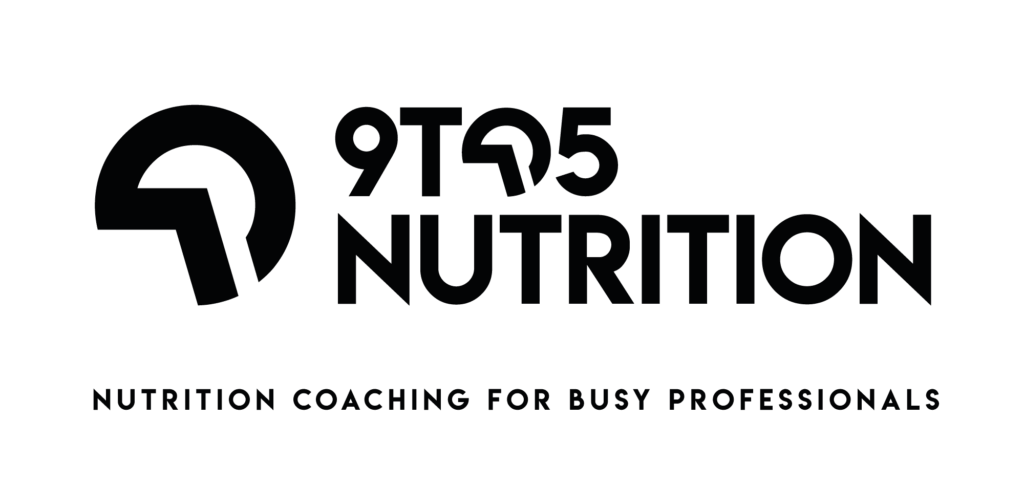
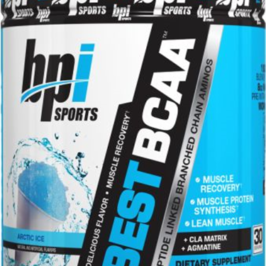
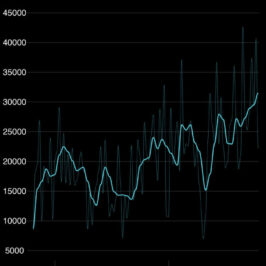
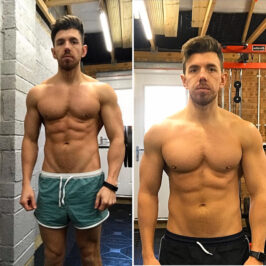
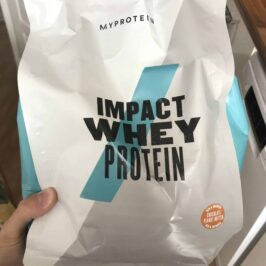
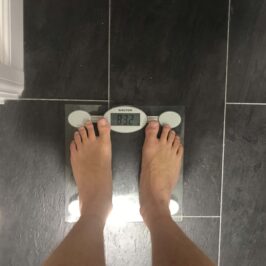
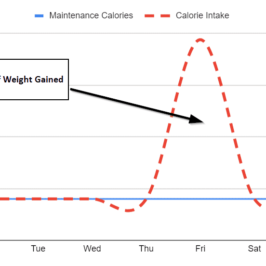
Leave a Reply